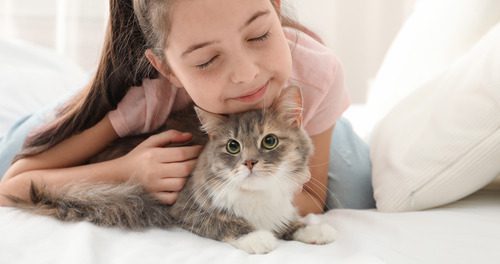How to Tell How Old a Kitten Is
When you find a kitten or bring a new one home, one of the first things you’ll want to know is its age. Knowing how to tell how old a kitten is can help you understand its needs and ensure it receives proper care. At Sahara Pines Animal Hospital in Las Vegas, NV, we’re here to help you navigate this exciting journey. In this blog, we’ll explore various methods to determine your kitten’s age. For personalized advice, call us at (702) 876-7580 or request an appointment online.

Understanding the Newborn Stage
The first step in determining how to tell how old a kitten is involves understanding the characteristics of newborn kittens. Newborn kittens are completely dependent on their mother or caregiver. They are usually between 0 and 2 weeks old and have specific features and behaviors that can help you estimate their age.
Characteristics of Newborn Kittens
Newborn kittens are born with their eyes closed and their ears folded. Their eyes typically begin to open between 7 and 10 days after birth, starting with a narrow slit and gradually opening fully. At this stage, their eye color will likely be blue. Their ears will also start to unfold during this period, and they will begin to respond to sounds.
Kittens this young will not be able to regulate their body temperature, so they rely heavily on external warmth. They also need to be fed every 2-3 hours, as their tiny stomachs can’t hold much food. You can often hear them mewing loudly if they are hungry or cold.
Physical Appearance
A newborn kitten’s physical appearance provides clues to its age. They are usually small, weighing between 85 to 115 grams. Their umbilical cords usually fall off within the first week. Observing these characteristics can give you a good indication of whether a kitten is in the newborn stage.
Recognizing the Transitional Phase
From 2 to 4 weeks of age, kittens enter a transitional phase. This period is marked by rapid growth and development. During this phase, kittens will start to become more mobile. They will begin to crawl and may even attempt to stand. Their coordination is still developing, so their movements may be wobbly and unsteady. This newfound mobility indicates that they are starting to explore their environment.
Developmental Milestones
Around 3 weeks old, kittens’ teeth will start to come in. The first teeth to emerge are usually the incisors, followed by the canines. This teething process can be a good indicator of age. By the end of the fourth week, kittens will have a full set of baby teeth. Their eyes, which opened in the previous stage, will start to change color around 4 weeks of age. This transition from blue to their adult eye color provides another clue about their age. Additionally, their ears will be fully erect by this stage, and they will become more responsive to their surroundings.
Socialization and Play
Between 4 and 8 weeks of age, kittens enter a crucial socialization period. This phase is vital for their behavioral development and offers clear signs of how to tell how old a kitten is. Observing their interactions and play behaviors can provide valuable insights into their age. Kittens in this age range will begin to play with their littermates. This play includes pouncing, wrestling, and chasing, which helps them develop their coordination and social skills. They will also start to groom themselves and each other, which is an essential part of their social behavior.
Introduction to Solid Food
At around 4 weeks, kittens will start to show interest in solid food. This weaning process is a significant milestone. Initially, they will try soft, mushy foods, and by 6 weeks, they should be able to eat dry kitten food. Kittens will also begin to use the litter box around this time. Their mother typically teaches them this behavior, but if the kitten is orphaned, you may need to guide them. Successful litter box use indicates they are at least 4 weeks old.
Adolescence: Growing Independence
From 8 to 16 weeks, kittens rapidly grow and develop independence. This period is marked by significant changes in behavior and physical appearance, making it easier to tell how old a kitten is. Kittens will become more adventurous and curious. They will start to explore their environment more confidently, climbing and jumping with greater agility. Their coordination and strength improve significantly during this time.
Health and Veterinary Care
This is also the time when kittens should begin receiving vaccinations and deworming treatments. Regular veterinary visits during this period are crucial for their health. If you’re unsure about your kitten’s age, a veterinarian can provide a more accurate estimate based on their physical and dental examination. By 12 weeks, kittens will have lost most of their baby teeth and will begin to get their permanent teeth. This dental development is a reliable indicator of their age. Additionally, their adult eye color will be established by this stage.
Entering the Juvenile Stage
From 16 weeks onward, kittens enter the juvenile stage, which lasts until they are about one year old. This period is characterized by continued growth and behavioral changes. Kittens will continue to grow rapidly, but their growth rate will start to slow down. By 6 months, they will have reached about 75% of their adult size. Their energy levels will remain high, and they will be very playful and active.
Behavioral Changes
As kittens mature, their behavior will begin to resemble that of an adult cat. They will become more independent and may start to establish their own territories. Their social interactions will become more complex, and they will develop a clear hierarchy if they live with other cats. By understanding these stages and observing the corresponding behaviors and physical traits, you can accurately estimate how old your kitten is.
Schedule Your Kitten’s First Appointment With Us Today!
Determining how old a kitten is can be challenging, but it is essential for providing the best care. If you have any questions or need help with your kitten, contact Sahara Pines Animal Hospital. Our team of experienced veterinarians is here to support you and your new furry friend. Call us at (702) 876-7580 or request an appointment online. We’re here to help you ensure your kitten grows up healthy and happy.
Recent Posts
About Sahara Pines Animal Hospital
For exceptional veterinary care in an environment that welcomes you as family, partner with Sahara Pines Animal Hospital and we’ll help you meet all your pet’s needs for a lifetime.




